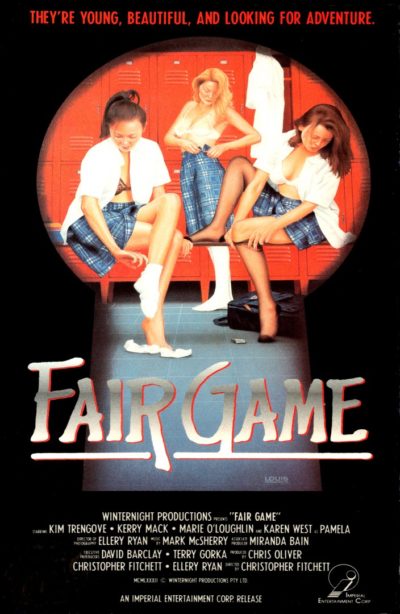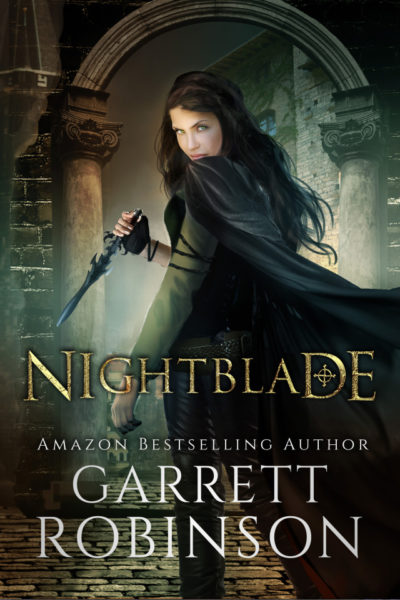Literary rating: ★★½
Kick-butt quotient: ☆☆☆
 The saying, “You only live twice,” is supposed to be a metaphor, but for Eden Hunter, it ends up being very much a statement of fact. She’s a former con-artist, dragged back from beyond the grave by vampire warlord, Aldric. He puts her to work on a hidden island as his personal soul-harvester, with a strict quota per week. It’s not great work, but it’s steady – at least until Eden’s beach-front house is attacked by a werewolf with murder on its furry mind. She then finds herself seen by the FBI as their prime suspect after an old partner in confidence tricks turns up dead on her doorstep. But, wait! There’s more! She has to deal with the rain goddess – presumably, the source of the title – to whom Eden is also in thrall, and whose rules she just broke. A gang involved in robbing her boss of millions in gold bullion. Her dead sister. A serial-killer politician. Oh, and a talking cat.
The saying, “You only live twice,” is supposed to be a metaphor, but for Eden Hunter, it ends up being very much a statement of fact. She’s a former con-artist, dragged back from beyond the grave by vampire warlord, Aldric. He puts her to work on a hidden island as his personal soul-harvester, with a strict quota per week. It’s not great work, but it’s steady – at least until Eden’s beach-front house is attacked by a werewolf with murder on its furry mind. She then finds herself seen by the FBI as their prime suspect after an old partner in confidence tricks turns up dead on her doorstep. But, wait! There’s more! She has to deal with the rain goddess – presumably, the source of the title – to whom Eden is also in thrall, and whose rules she just broke. A gang involved in robbing her boss of millions in gold bullion. Her dead sister. A serial-killer politician. Oh, and a talking cat.
Overall, the main problem is that this feels like Book 2, rather than Book 1. Rather than starting off at what might be considered the more logical point of Eden’s first death, it joins her career as a reaper, already well in progress, opening with the werewolf attack. There is a fair amount of information – and quite important data, at that – which is not provided to the reader until some distance into the story. As the paragraph above suggests, there’s not exactly a shortage of plot threads either: as a result, some of them inevitably end up feeling under-developed. The goddess, for example, seems to show up at the end, purely to provide an adversary for the heroine’s boss, and I’m still not sure about the point of the politician. Conversely, some things feel under-explained. The island is supposedly hidden… yet the FBI know where it is? Who delivers – oh, I dunno – milk to it? It has an awkward sense of being something which looked a good idea at the time, only was never thought through properly.
It’s probably not the book’s fault, but there was a sense of deja vu too for me. Only a couple of months ago, I read Fugitive of Magic by Linsey Hall. It was also a story told in first-person perspective, about a paranormal heroine accused of a murder she didn’t commit, who has to find the real perpetrator in order to prove her innocence. Having recently read that story, I didn’t find a revised version of it especially interesting. The main positive is Eden herself, who made for a decent central character. There was a nice moral sense of grey about her choices, with her trying to do the right thing, even though those choices were frequently constrained by the unfortunate circumstances which she inhabited. If we’d been brought along with Eden on her resurrection, rather than being dumped into the middle of it, this would likely have been a more worthwhile story.
Author: D.N. Erikson
Publisher: Watchfire Press, available through Amazon as both a paperback and an e-book.
Book 1 of 3 (to date) in the Sunshine & Scythes series.





 I must have masochistic tendencies. For having seen Bryan’s
I must have masochistic tendencies. For having seen Bryan’s  There’s no hanging around here. Virtually as we meet our heroine, Hsiang Ying (Lee), she’s getting tossed off a cliff by her kung-fu teacher, into a pack of wolves. Having survived that and made her way back – perhaps assuming this was all some terrible misunderstanding – her master then disavows her, announces he was the man responsible for killing her father, and locks her up in a cage. This all happens within, literally, three minutes of the film starting. Fortunately, a passing stranger sees fit to free her from the cage, and the ‘Heartless Lady’, as she becomes known, can go on her way, with the eventual aim of being exactly what the title suggests: revengeful.
There’s no hanging around here. Virtually as we meet our heroine, Hsiang Ying (Lee), she’s getting tossed off a cliff by her kung-fu teacher, into a pack of wolves. Having survived that and made her way back – perhaps assuming this was all some terrible misunderstanding – her master then disavows her, announces he was the man responsible for killing her father, and locks her up in a cage. This all happens within, literally, three minutes of the film starting. Fortunately, a passing stranger sees fit to free her from the cage, and the ‘Heartless Lady’, as she becomes known, can go on her way, with the eventual aim of being exactly what the title suggests: revengeful. Back when I was growing up in Britain during the eighties, I was a voracious reader of horror fiction. The two staples of my literary diet were the works of James Herbert, who occupied the more “literary” end of the spectrum, and Shaun Hutson, whose novels were about as subtle as a kick to the groin. This likely tends towards the latter end of the spectrum, being a straightforward tale of survival during the zombie apocalypse. It begins as Olivia Bennett is heading home from lunch with her husband, when the St. Louis freeway on which she is driving becomes one of the first killing zones.
Back when I was growing up in Britain during the eighties, I was a voracious reader of horror fiction. The two staples of my literary diet were the works of James Herbert, who occupied the more “literary” end of the spectrum, and Shaun Hutson, whose novels were about as subtle as a kick to the groin. This likely tends towards the latter end of the spectrum, being a straightforward tale of survival during the zombie apocalypse. It begins as Olivia Bennett is heading home from lunch with her husband, when the St. Louis freeway on which she is driving becomes one of the first killing zones. In particular, not to be confused with the Cindy Crawford film of the same name. But for the purposes of this site, more importantly, not to be confused with the film of the same name,
In particular, not to be confused with the Cindy Crawford film of the same name. But for the purposes of this site, more importantly, not to be confused with the film of the same name,  Country singer Chelsea Angel (Christensen) announces to her fanbase that’s she taking a time-out from touring and recording – not least because of her recently-discovered pregnancy. Her flight home crashes in the middle of nowhere, and she wakes up to find herself chained up in a remote cabin, along with another survivor, Evelyn (James). Except, it soon turns out that Evelyn isn’t the innocent air hostess she initially appears. She’s Chelsea’s most obsessive and dedicated fan, who was actually responsible for the plane going down. And now, she has the object of her affection – not to mention, her unborn baby – all to herself, for some quality time, in which she can address Chelsea’s new style, with which Evelyn is not happy. Meanwhile, the singer’s boyfriend, Dillon (Lauren), and the guy in charge of her fan-club, Frank (Kirkpatrick), are trying to figure out where Chelsea has gone, following the online trail Evelyn left behind.
Country singer Chelsea Angel (Christensen) announces to her fanbase that’s she taking a time-out from touring and recording – not least because of her recently-discovered pregnancy. Her flight home crashes in the middle of nowhere, and she wakes up to find herself chained up in a remote cabin, along with another survivor, Evelyn (James). Except, it soon turns out that Evelyn isn’t the innocent air hostess she initially appears. She’s Chelsea’s most obsessive and dedicated fan, who was actually responsible for the plane going down. And now, she has the object of her affection – not to mention, her unborn baby – all to herself, for some quality time, in which she can address Chelsea’s new style, with which Evelyn is not happy. Meanwhile, the singer’s boyfriend, Dillon (Lauren), and the guy in charge of her fan-club, Frank (Kirkpatrick), are trying to figure out where Chelsea has gone, following the online trail Evelyn left behind. Having started our acquaintance with the Ladies Shooting Club trilogy last year with the third book, The Blacksmith’s Bravery (long story), my wife Barb and I are now reading the other two volumes in order. Neither of us were disappointed in this one! My reviewing it here was a happy surprise. Although the covers of all three books feature gun-toting women, and a basic plot current of the trilogy is women learning to take responsibility for defending themselves and others, the heroine of the third book wasn’t actually called on to engage in any gun-fighting action. So I assumed the same would be the case here. But [at the risk of a mild “spoiler” –though for fans of this site, this will add interest rather than spoil it :-)], in this series opener, our heroine does need to step up to the plate with a Winchester. (Contrary to many fictional and movie depictions, rifles were used more for serious shooting in the Old West than six-guns). Despite that difference, though, both books have a lot of similarity in tone, content and style. Since I gave the concluding volume five stars on Goodreads, that’s a good thing!
Having started our acquaintance with the Ladies Shooting Club trilogy last year with the third book, The Blacksmith’s Bravery (long story), my wife Barb and I are now reading the other two volumes in order. Neither of us were disappointed in this one! My reviewing it here was a happy surprise. Although the covers of all three books feature gun-toting women, and a basic plot current of the trilogy is women learning to take responsibility for defending themselves and others, the heroine of the third book wasn’t actually called on to engage in any gun-fighting action. So I assumed the same would be the case here. But [at the risk of a mild “spoiler” –though for fans of this site, this will add interest rather than spoil it :-)], in this series opener, our heroine does need to step up to the plate with a Winchester. (Contrary to many fictional and movie depictions, rifles were used more for serious shooting in the Old West than six-guns). Despite that difference, though, both books have a lot of similarity in tone, content and style. Since I gave the concluding volume five stars on Goodreads, that’s a good thing! While not the first to be released, this was the first movie directed by Miike, who would go on to become one of the most prolific – yet, still, critically-lauded – directors to come out of Japan in the last quarter-century. Perhaps this is well-informed hindsight: yet, if still pretty basic in its content, it does feels at least somewhat above what you would expect from a straight-to-video movie by a first-time director.
While not the first to be released, this was the first movie directed by Miike, who would go on to become one of the most prolific – yet, still, critically-lauded – directors to come out of Japan in the last quarter-century. Perhaps this is well-informed hindsight: yet, if still pretty basic in its content, it does feels at least somewhat above what you would expect from a straight-to-video movie by a first-time director. Despite the distinctly retro feel of the poster, intro and much of the music, this is very much a contemporary affair. Mary (Henson) is an enforcer working for Benny (Glover): at one point, she was in a relationship with his son, Tom (Brown), and he still wants to continue it. During one hit on a debtor, she finds the target’s young son, Danny (Winston), obliviously playing video-games in his bedroom. Struck by guilt, she leaves him alone, and keeps an eye on the kid thereafter. A year later, she rescues him from the abusive drug dealer who has “adopted” Danny, but the resulting bloodbath is a big problem. For the dealer in question worked for Benny’s biggest rival, who is not happy about the removal and demands Benny find the culprit. Mary, who was already fed up and wanting out of her career, has to decide exactly where her loyalties lie.
Despite the distinctly retro feel of the poster, intro and much of the music, this is very much a contemporary affair. Mary (Henson) is an enforcer working for Benny (Glover): at one point, she was in a relationship with his son, Tom (Brown), and he still wants to continue it. During one hit on a debtor, she finds the target’s young son, Danny (Winston), obliviously playing video-games in his bedroom. Struck by guilt, she leaves him alone, and keeps an eye on the kid thereafter. A year later, she rescues him from the abusive drug dealer who has “adopted” Danny, but the resulting bloodbath is a big problem. For the dealer in question worked for Benny’s biggest rival, who is not happy about the removal and demands Benny find the culprit. Mary, who was already fed up and wanting out of her career, has to decide exactly where her loyalties lie.
 One of the common problems I’ve found with fantasy novels is establishing the universe. It’s clearly going to be very different from the reader’s, and the author needs to get them up to speed on how things work in the book’s setting. If this isn’t done quickly and effectively, the reader can be left floundering in a world they know nothing about. Robinson uses a neat trick to get around this. His heroine, Loren, basically knows nothing about it either, because she has been brought up in a remote rural area. Virtually all she knows about life outside the woods comes from tales told to her by an itinerant tinker, and her dreams of becoming a heroic thief seem no more than fantasies.
One of the common problems I’ve found with fantasy novels is establishing the universe. It’s clearly going to be very different from the reader’s, and the author needs to get them up to speed on how things work in the book’s setting. If this isn’t done quickly and effectively, the reader can be left floundering in a world they know nothing about. Robinson uses a neat trick to get around this. His heroine, Loren, basically knows nothing about it either, because she has been brought up in a remote rural area. Virtually all she knows about life outside the woods comes from tales told to her by an itinerant tinker, and her dreams of becoming a heroic thief seem no more than fantasies.